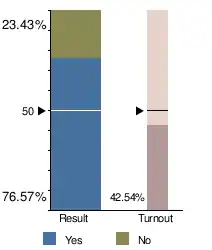| ||||||||||||||||
"Do you approve of the creation of the province of Davao Occidental out of the province of Davao del Sur which shall be composed of the municipalities of Santa Maria, Malita, Don Marcelino, Jose Abad Santos and Sarangani pursuant to Republic Act No. 10360 dated July 23, 2012?[1] | ||||||||||||||||
| Results | ||||||||||||||||
|---|---|---|---|---|---|---|---|---|---|---|---|---|---|---|---|---|
| ||||||||||||||||
On October 28, 2013, residents of Davao del Sur voted in a plebiscite to approve or disapprove the creation of the then proposed province of Davao Occidental.
Background
The creation of Davao Occidental was first proposed by then Davao del Sur congressman, Marc Douglas Cagas IV in 2013, while his father, Douglas Cagas, was still the governor of Davao del Sur. The proposed province was to compose all municipalities of Davao del Sur under the 2nd legislative district at that time. Cagas withdrew his proposal as the 2013 Philippine elections drew near.[2]
The proposal was revived by Franklin Bautista 2nd district congressman of Davao del Sur.[2] Bautista passed a law proposing the creation of the province, was passed in Congress, and approved by President Benigno Aquino III. Bautista's version of the law has a more limited scope with the municipalities of Santa Maria, Malita, Don Marcelino, Jose Abad Santos and Sarangani proposed to form Davao Occidental. Cagas' version included the municipalities of Kiblawan, Malalag and Sulop. The three municipalities opted out from being a part of the province proposed by Bautista.[2][3]
By virtue of Republic Act 10360 enacted on July 23, 2013, the province is the newest in the country, carved out from the southern part of Davao del Sur. RA 10360 was passed by the House of Representatives and Senate on November 28, 2012, and December 5, 2012, respectively, and signed by President Benigno Aquino III on January 14, 2013.[4][5] A plebiscite was to be held to ratify the law.
A majority vote of those who participated in the plebiscite was required to approve or disapprove the creation of Davao Occidental.[3] Registered voters of Davao del Sur except Davao City at the time of the plebiscite were eligible to vote.[6]
Results
The results of the plebiscite was announced by the COMELEC on October 30, 2013. Seventy-six percent of those who voted favored the creation of the new province.[3]

| Choice | Votes | % |
|---|---|---|
| 180,162 | 76.57 | |
| No | 55,139 | 23.43 |
| Total votes | 235,301 | 100.00 |
| Registered voters/turnout | 553,092 | 42.54 |
| Source: [3] | ||
Aftermath
Malita, was designated as capital of the new province and government officials of Davao del Sur with assistance from the Department of Interior and Local Government retains jurisdiction over the new province[3] until residents of the province vote for the province's own set of government officials in 2016.[2]
References
- ↑ "Resolution No. 9772". COMELEC. 9 September 2013. Retrieved 27 January 2016.
- 1 2 3 4 "Plebiscite results favor new Davao province". Philippine Daily Inquirer. 30 October 2013. Retrieved 27 January 2016.
- 1 2 3 4 5 Carillo, C.A. (10 November 2013). "Davao Occidental province to be created". BusinessWorld. Archived from the original on 25 February 2017. Retrieved 27 January 2016.
- ↑ Sec. 46, RA 10360 The Province of Davao Occidental shall be created, as provided for in this Charter, upon approval by the majority of the votes cast by the voters of the affected areas in a plebiscite to be conducted and supervised by the Commission on Elections (COMELEC) within sixty (60) days from the date of the effectivity of this Charter.
- ↑ "COMELEC to conduct plebiscite for the creation of Davao Occidental". Official Gazette of the Republic of the Philippines. COMELEC. September 18, 2013. Retrieved 7 November 2013.
- ↑ "COMELEC to Conduct Plebiscite for the Creation of Davao Occidental". COMELEC. 18 September 2013. Retrieved 27 January 2016.